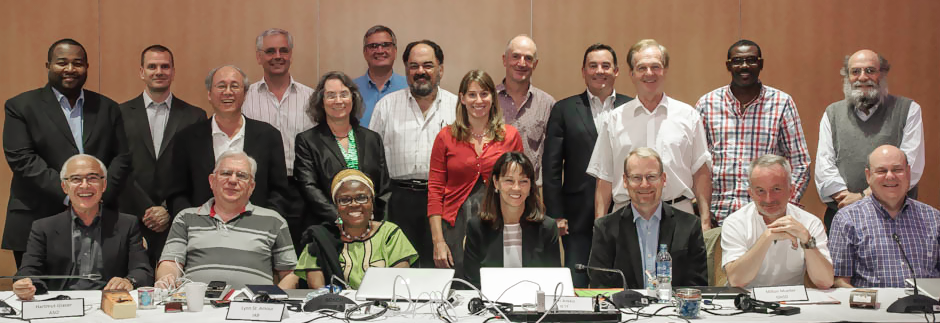Meet the IANA Stewardship Transition Coordination Group
ICG Meeting | 17 July 2014 | Not all members physically present
Members of the ICG
The IANA Stewardship Transition Coordination Group (ICG) is comprised of 30 individuals representing 13 communities, and includes direct and indirect stakeholders. These representatives have been selected by their respective communities.
At-Large Advisory Committee (ALAC)

Mohamed El Bashir
Vice Chair
Video Interview
Mohamed El Bashir is an active Internet user and expert, He has been active within ICANN since 2001 were he managed Sudan's ccTLD ".SD" Re-delegation process, .SD is currently managed by Sudan Internet Society, an organization which he established.
Mohamed served as a Council member in ICANN's Country Code Supporting Organization "ccNSO" (2004 to 2008), member of ICANN's Board At Large Advisory Committee "ALAC" (2007 to 2011) and was a member of ICANN's nominating committee (2011-2012). He was a founder and vice president of Africa's Top Level Domains Organization "AfTLD" (2004 to 2008). Mohamed is a founding member and currently vice chair of the Arab Internet Governance Multi-stakeholder Advisory Group. He is actively involved in the Internet governance issues and the Domain names and Internationalized Domain Names "IDN" policy developments. Mohamed is a founder/former president of Sudan Internet Society, he is a founder and a current board member of Qatar Internet Society chapter.
He has participated in the UN World Summit for Information Society "WSIS" process (Geneva and Tunis Summits) and attended most of the IGF meetings, Mohamed has been a regular panelist and organizer of workshops and events related to Internet governance issues. Since 2008 Mohamed joined Qatar's Supreme Council of Information and Communication Technology "ictQATAR" managing its Technical Affairs Department, he is responsible for Numbering, Internet Domains, broadband Infrastructure access and sharing. He has also established Qatar's Country Code Top Level domain new Registry and implemented the launch of Qatar's Arabic domain.
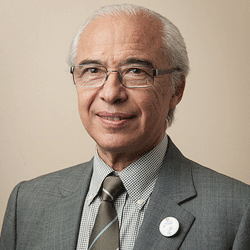
Jean-Jacques Subrenat
Video Interview
Jean-Jacques Subrenat is a former Ambassador and is currently a member of the NetMundial Initiative Coordination Council. Subrenat is a former member of the ICANN Board, appointed by the NomCom, 2007- 10. During his service on the Board, he was (successively or simultaneously) active in several Committees: President's Strategy Committee (where he was one of the authors of the "Implementation Plan for Improving Institutional Confidence"); Board Governance Committee; Structural Improvements Committee; Public Participation Committee (which he set up and chaired). He initiated the creation of the Global Relationships Committee, of which he was an inaugural member. Mr. Subrenat also took an active part in reviews: ALAC Review, Board Review, ccNSO Review (as its Chair).
Member of ALAC (2010-2014), Subrenat proposed that this Advisory Committee, while continuing its valuable work on ongoing business, take a longer-term and broader view of the Internet's and ICANN's future. His proposal was accepted, and the ALAC set up its Future Challenges Working Group (FCWG), of which he is the current Co-Chair. The FCWG produced the ALAC White Paper "Making ICANN Relevant, Responsive and Respected" (R3)], in the 6 UN working languages.
In the French foreign ministry, Mr. Subrenat was a Diplomatic adviser to the Minister for European affairs, deputy director for South-East Asian affairs, alternate director for the Americas. He was in the team which set up the French Agency for solar and renewable energies. Permanent representative and ambassador to the WEU (Brussels), ambassador to Estonia, ambassador to Finland, acing governor in the Board of governors of ASEF, other activities include: Tutor at the French International institute for public administration (IIAP, Paris), later at the National school for public administration (ENA, Strasbourg); Chair of the advisory board, Institut Pierre Werner (Luxembourg); Senior advisor to the Board, Neumunster cultural centre (CCRN, Luxembourg) and, in that capacity, member of the Board, European Union national institutes of culture (EUNIC); member of the interim leadership team, Individual Users' Association.
Address Supporting Organization (ASO)
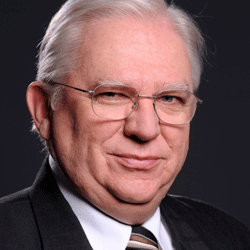
Hartmut Glaser
Video Interview
Professor Hartmut Richard Glaser is the Executive Secretary of the Brazilian Internet Steering Committee - CGI.br in Brazil, a "multistakeholder" body that coordinates all internet activities in Brazil, since 1996.
Before he take over this position, he was Researcher at Van de Graaff Laboratory at the Physics Institute of USP/São Paulo State University (1968/1970); then he was Researcher at the Microelectronics Laboratory at the Polytechnic School (Engineering Faculty) of USP(1970/1990); Special Adviser to the Director (Dean) of the Polytechnic School of USP (1989/1993); Special Adviser to the President of FAPESP/Foundation for Research Support of the State of São Paulo (1996/2004); Coordinator of the Academic Network/ANSP at the State of São Paulo (1996/2002); Board Member of LACNIC (2000/until now); Member of the Address Council (AC) of the Address Supporting Organization (ASO/NRO) of ICANN (2000/until now); Member of ICANN's "Nominating Committee" for 7 years; Local Organizer of two ICANN Meetings in Brazil, 2003 (Rio de Janeiro) and 2006 (São Paulo); Local Organizer of the "2. IGF - Internet Governance Forum" 2007 in Rio de Janeiro/Brasil; Local Organizer of NETmundial 2014 in São Paulo/Brazil; Faculty Member of the "Summer School of Internet Governance" in Buenos Aires/Argentina (2009), in São Paulo/Brazil (2010) and in Meissen/Germany (2009/2014); Special Adviser to Nitin Desai, the general coordinator of all 5 IGFs/Internet Governance Fora.
Country Code Names Supporting Organization (ccNSO)
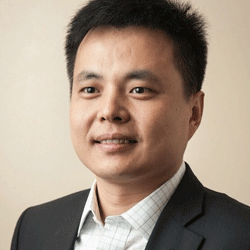
Xiaodong Lee
Video Interview
Dr. Xiaodong Lee is the CEO&CTO of CNNIC, which is the ".CN" registry, he received his Ph.D. of Computer Architecture in the Institute of Computing Technology of Chinese Academy of Sciences (CAS). Dr. Xiaodong Lee now holds the positions of Research Professor of Chinese Academy of Sciences. He is also the Vice Chairman and Executive Director of China National Engineering Laboratory of Internet Naming and Addressing Technologies.
Under the leadership of Dr. Xiaodong Lee, many critical construction projects were implemented, such as global service platform for national domain name system, Data Backup Centers, Monitoring and Analysis Platform and so on. Moreover, Dr. Xiaodong Lee organized and accomplished several international and domestic technology standards in the fields of domain name and email, the application and delegation of "dotChina", he used to be the main IDN contributor and co-Chair of EAI WG of IETF, as well as the research and development of the first series of software and hardware system of domain name service in China.
Previously honored as one of the "Ten Outstanding Youth" in China's software industry and awarded "Outstanding Youth Medal of China" in 2009, Dr. Xiaodong Lee is currently Member of All-China Youth Federation.
Dr. Xiaodong Lee is the member of ICANN SSAC, member of MAG of Internet Governance Forum, and member of Global Agenda Council of World Economic Forum.
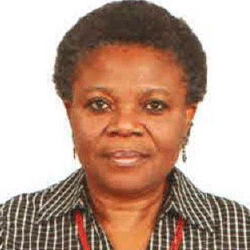
Mary Uduma
Video Interview
Mrs. Mary Nma Uduma is the President of Nigeria Internet Registration Association (NIRA), the mangers of .ng country code Top Level Domain, she is a pioneer Vice President of the Board. She has over 35 years of working experience in various sectors including Education, Banking, Public Accounts, Government, Telecommunications Regulation.
Mrs. Uduma has been instrumental to the development of Telecoms and DNS industries in Nigeria. Under her leadership, NIRA has witnessed a strong growth of the .ng brand in the DNS industry in Nigeria. She is the Convener of Nigeria Internet Governance Forum (NIGF) and chairs the Local Multistakeholder Advisory Group of NIGF; she is the Nigeria's focal person for the West Africa IGF; she chaired the Organising Committee of Africa IGF 2014; She is an Executive Committee member of Africa Top Level Domain Organization (AfTLD).
Mrs. Mary Uduma represents .ng Registry (NIRA) in ccNSO and had represented Nigeria in GAC for over 4 years up to 2012 when she retired from Nigeria Communications Commission (NCC). She was part of the WSIS 2003 and 2005 processes. She had been a focal person for ITU matters while in NCC.
She is an advocate of Child Online protection. Mrs. Uduma is a Professional Accountant, holds B.Sc in Accounting, Certificates in Education, Telecommunications Regulation, Public Private Partnership Financing, etc.

Keith Davidson
Video Interview
Keith Davidson is contracted by InternetNZ in the role of International Director, since August 2009. He has previously had many roles within InternetNZ. Previously, he was the Executive Director for InternetNZ from 2005 to 2009, and before the role of Executive Director he was the President / Chairman of InternetNZ from 2001 to 2005. Keith was the Treasurer at the same organization from 1999 to 2001. He joined the organization as a councilor in 1998. He also served as the Chair of the APTLD Board of Directors for three years until February 2012.
He also currently serves on ICANN's ccNSO Council as Vice Chair; from March 2010 until March 2016. Keith currently also serves on The Internet Society Board of Trustees.
He has also worked as the Owner and Manager of WISENet, which was an Internet Service Provider in New Zealand, from the 1990's until 2003. From 1994 to 2002 he was the General Manager of the daily newspaper the Wairarapa Times-Age.
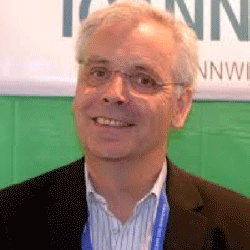
Martin Boyle
Video Interview
Martin Boyle joined Nominet in 2008 as Senior Policy Advisor. He is currently focused on international Internet governance and policy issues, working in ICANN, the Internet Governance Forum, the International Telecommunications Union and the Commonwealth Telecommunications Organisation. Nominet is a founder and main coordinator of the UK-IGF.
Previously he worked for the UK government, representing the UK in the World Summit on the Information Society for Internet governance infrastructure issues and was the UK government representative in the GAC.
Governmental Advisory Committee (GAC)

Manal Ismail
Video Interview
Mrs. Manal Ismail is Executive Director for International Technical Coordination at the National Telecom Regulatory Authority (NTRA) of Egypt. Prior to her work at the NTRA, she has worked at the Egyptian Ministry of Communications and Information Technology (MCIT). Mrs. Ismail started her career at the Cabinet Information and Decision Support Center (IDSC), in charge of DNS operation and Internet access, and was among the team who first introduced the Internet to Egypt.
Mrs. Ismail is an active member of the global Internet community. She has participated to all global Internet Governance Forum (IGF) meetings, was member of the NETmundial Executive Multistakeholder Committee, represents Egypt at the Governmental Advisory Committee (GAC) of ICANN and has served as one of its vice chairs. She has also served as vice chair of the ICANN Accountability and Transparency Review Team (ATRT1), is co-chairing the Board-GAC Recommendation Implementation Working Group (BGRI-WG) as well as co-chairing the GAC-GNSO Consultation Group on GAC Early Engagement in GNSO PDP. She is member of ICANN Middle East Strategy Working Group (MESWG) and founding member of the Internet Society Chapter of Egypt (ISOC-EG).
In addition, Mrs. Ismail has previously led GAC discussions on IDNs, co-chaired the IDNC Working Group, and participated to the ccNSO IDN ccPDP Working Group 1. She is member of the League of Arab States Working Group on Domain Names and has contributed to various early script community efforts on IDNs – Arabic Script IDN Working Group (ASWIG). Furthermore, Mrs. Ismail is a founding member of the Internet Numbers Registry for Africa (AfriNIC) and has been involved in establishing the "AfriNIC mirror center for technical operation" in Egypt.
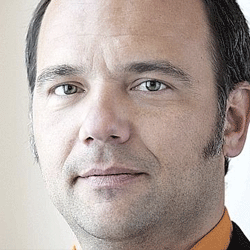
Thomas Schneider
Thomas Schneider is an expert in Internet governance and in the governance of the information society, in particular media/new media regulation, human rights and consumer protection. Schneider is currently the International Information Society Coordinator and Deputy Head of International Affairs at the Swiss Federal Office of Communication (OFCOM).
He is representing Switzerland in the UN Commission on Science and Technology for Development (CSTD), which is responsible for assessing the WSIS-Follow-up in the UN System. He is acting as regional coordinator for the WEOG governments in the Multistakeholder Advisory Group (MAG) of the Internet Governance Forum and as of October 2014, is serving as the Chairman of ICANN's Governmental Advisory Committee (GAC). Thomas Schneider is one of the initiators and coordinators of EuroDIG, the European IGF and vice-chair of the Council of Europe's new Steering Committee on Media and the Information Society (CDSMI). He is representing Switzerland in the ITU Council Working on WSIS (CWG WSIS) and has been cochairing the ITU Council Working Group on stakeholder participation in ITU's activities related to WSIS (2006-2009). From 2003 to 2005, he was coordinating all Swiss activities in both phases of WSIS (Geneva 2003 and Tunis 2005).
Schneider was born in St. Gallen in 1972 and lives near Zürich. He studied in Zürich and Berlin and has a master's degree in history, national economics and English literature. He likes alternative rock music and French vintage cars with hydraulic suspension. He is able to communicate in English, French, German, Italian and Spanish.
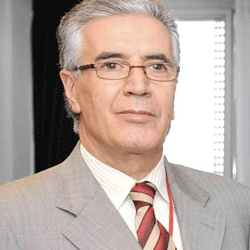
Kavouss Arasteh
Mr. Arasteh's education includes the B.Sc. in Electronics and Electrical Engineering (1964) from the Faculty of Telecommunication, Teheran, Iran, a M.Sc. in Electrical Engineering, with a concentration in Telecommunications (1975), from the University of
Essex, Colchester, United Kingdom. He is fluent in oral and written English, with good proficiency in French, and a working knowledge of Spanish.
In telecommunications all his professional life, his national experience began with a rapidly expanding telecommunication and broadcasting systems, culminating in a few
years as Director of International Technical Affairs for the application of radio regulations and frequency management systems. Concurrently he served as Chief Coordinator for all national studies relating to preparatory works for Plenipotentiary
Conferences, World and Regional radiocommunication Conferences, other ITU Assemblies and Conferences (RA, WTDC, WTSA, RAG, TSAG and TDAG) as well as ITU Study Groups.
Since 1991 Mr. Arasteh served as Head, Notification and Plans Division of the Space Services Department/SSD, at times serving as Acting Head SSD. He participated in CCIR/ITU-R Study Groups for World Administrative Radio Conferences, preparing various reports to these fora and serving as secretary to several WARC/WRC committees and subcommittees.
After retiring from ITU in April 2001, Mr. Arasteh continued from 2001 till now to demonstrate his high quality performance in attending various ITU meetings and positively and constructively contributing to the activities of the Union, mainly, in radiocommunication Sector.
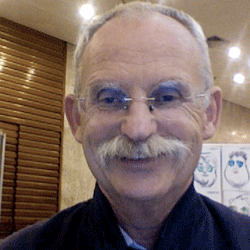
Michael Niebel
Michael Niebel is Adviser for Internet Policy and Technology at the European Commission. He has been heading the Internet Policy Development Task Force that prepared the 2014 Commission Communication on Internet Policy and Governance. In the context of the World Summit on the Information Society, he participated in the preparatory work and the negotiations leading to the Tunis Agenda. Michael has been joining global multistakeholder exchanges at the Internet Governance Forum meetings since the first IGF in Athens. In the preparation of and during the Global Multistakeholder Meeting on the Future of Internet Governance he worked in the
Executive Multistakeholder Committee of NETmundial.
At the end of the 1990's, Michael was involved in the definition of the European position during the process leading to the creation of ICANN. For 7 years he was member of ICANN's Governmental Advisory Committee. In 2013/14 he served in the Expert Working Group on gTLD Directory Services.
Michael has been responsible for Network and Information Security Policy and the establishment of the European Network and Information Security Agency (ENISA). He was also in charge of setting up process and framework for the introduction of the .eu top-level domain.
Past activities include telecommunication liberalization, audiovisual and media, data protection as well as intellectual property.
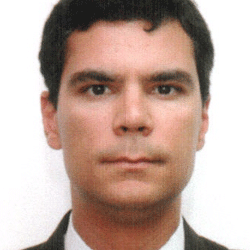
Jandyr Ferreira dos Santos
Video Interview
Jandyr Santos Jr. is the Head of the Information Society Division for the Ministry of External Relations of the Government of Brazil.
Jandyr Santos Jr. is a Brazilian diplomat. He joined the Ministry of External Relations of Brazil in 2000. Since then he alternated between overseas postings and positions in Brasilia. He served at the Brazilian Mission to the United Nations in New York, the Embassy of Brazil in New Delhi and the Embassy of Brazil in Maputo.
He currently heads the unit of the Ministry of External Relations of Brazil responsible for Internet Governance negotiations. He lives in Brasilia.
Generic Names Supporting Organization (GNSO)
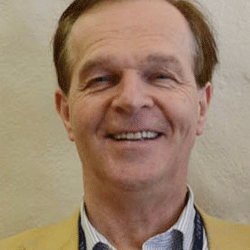
Wolf-Ulrich Knoben
Video Interview
Wolf-Ulrich Knoben is a German engineer with business experience of more than 30 years in the telecommunications sector. Having worked for several years in different countries (Europe and China) he is now consulting DE-CIX, the world's largest Internet Exchange a subsidiary of the Association of the German Internet Industry "eco".
Mr. Knoben is vice chair of ICANN's Internet Services Provider and Connectivity Provider constituency (ISPCP). He joined the ICANN community in 2007 and represented the ISPCP on the GNSO council from 2009 through 2013 including two years as council vice chair. He is also a member of ISOC.
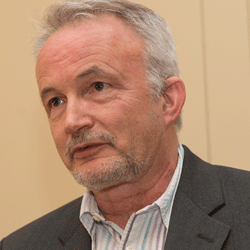
Milton Mueller
Video Interview
Milton Mueller (Ph.D., University of Pennsylvania, 1989) is Professor at Syracuse University School of Information Studies, USA. His research focuses on institutions and global governance in communication and information industries. Currently, he is doing research on the relationship between foreign policy, cybersecurity and Internet governance; IP addressing policy, and the security governance practices of ISPs.
His books Ruling the Root: Internet Governance and the Taming of Cyberspace (MIT Press, 2002) and Networks and States: The Global Politics of Internet Governance, (MIT Press 2010) are considered foundational contributions to the literature on Internet governance.
As a co-founder of ICANN's Noncommercial Users Constituency, he has played a leading role in organizing and mobilizing civil society in ICANN, the Internet Governance Forum and OECD. In 2013, Mueller was elected to serve on the Advisory Council of the American Registry for Internet Numbers (ARIN).

James Bladel
Video Interview
James Bladel is the Senior Policy Director for GoDaddy, the world's largest domain name registrar and web host. In this role, James represents GoDaddys interests in ICANN, as well as ccTLD and other industry and governance organizations. James currently represents North American Registrars on the GNSO Council.
Past roles include the WHOIS Review Team (RT4), the Accountability and
Transparency Review Team (ATRT), the US delegation to WCIT-12 (Dubai), and various PDP and non-PDP working groups. James is also on the Board of Directors for the dot ME (Montenegro) Registry, the Center for Safe Internet Pharmacies (CSIP), and is a member of the US delegation to the upcoming ITU Plenipotentiary (PP-14).
Generic Top-Level Domain Registries (gTLD Registries)
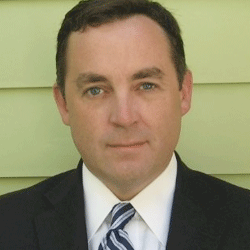
Keith Drazek
Video Interview
Keith Drazek is Vice President of Public Policy and Government Relations at Verisign, Inc., operator of the .COM and .NET domain name registries and two of the world's 13 Internet root servers. Keith has been active in the ICANN community for more than a decade, including in his current role as Chair of ICANN's GNSO Registry Stakeholder Group.
Prior to joining Verisign in 2010, he worked for ten years at the U.S. Department of State, and ten years in the domain name industry - 2 years at a registrar and 8 years at a registry. His experience in the domain name industry includes business development, channel management, government relations, external affairs, and Internet policy development. He studied International Relations at George Washington University in Washington, DC.
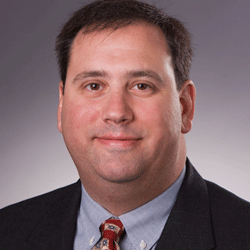
Jon Nevett
Jonathon Nevett is one of Donuts' Co-Founders and serves as its EVP for Corporate Affairs and on its Board of Directors. Jon also is a founding Board member of the Domain Name Association, the domain name industry's trade association. Previously, Jon served as Senior Vice President at Network Solutions.
Jon has served on numerous ICANN task forces, working groups, and panels. Most recently, he helped form and served as the first Chair of the New gTLD Applicant Group (NTAG). Jon has served as a member of the Implementation Recommendation Team (IRT), the Special Trademark Issue team (STI), and on the International Trademark Association's Internet Committee. Jon also served for three terms as the elected Chair of the ICANN Registrar Constituency and co-chaired the U.S. Council for International Business' Domain Name System Working Group. In 2009, Jon was appointed to the U.S. Department of Commerce's Online Safety and Technology Working Group related to issues of child safety and the Internet.
Jon received his Juris Doctor from Harvard Law School and his undergraduate degree from Binghamton University.
International Chamber of Commerce, Business Action to Support the Information Society (ICC/BASIS)
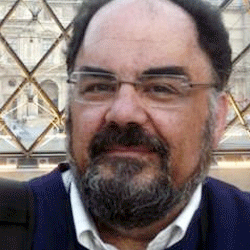
Joseph Alhadeff
Video Interview
Joseph H. Alhadeff is the Vice President for Global Public Policy and Chief Privacy Strategist for Oracle Corporation, the world's leading supplier of information management software and hardware. Mr. Alhadeff is responsible for coordinating and managing Oracle's global privacy and public policy issues.
In addition to his role at Oracle, Mr. Alhadeff serves a prominent role in several influential international organizations dedicated to Internet policy, security and privacy. Among his international affiliations, Mr. Alhadeff serves as the BIAC Chair to the OECD ICCP Committee, head of industry delegation to the OECD Security Steering Group, and Chairs the International Chamber of Commerce's Digital Economy Committee. In the US, Mr. Alhadeff chairs the Digital Economy Committee for the US India Business Council is Vice Chair of the USCIB's Information Policy Committee is US Co-chair of the TABC IT Committee and Chairs the Malaysia Committee and Co-chairs the IT Committee of the US-ASEAN Business Council. Mr. Alhadeff has also served as the chair of the Privacy, Governance and ID Management Working Group of the EC's business expert group on Cloud Computing.
Prior to joining Oracle, Mr. Alhadeff was General Counsel and Vice President for Electronic Commerce for the US Council for International Business (USCIB) in New York. Alhadeff holds and M.B.A. in management and information systems from New York University, Leonard N. Stern School of Business and a J.D. from Boston University School of Law, and a B.A. from Oberlin College.
Internet Architecture Board (IAB)
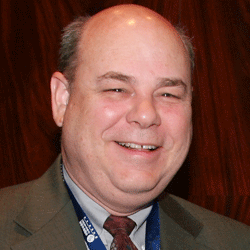
Russ Housley
Mr. Housley is the Founder of Vigil Security, LLC, and he is coauthor of "Planning for PKI" and "Implementing Email and Security Tokens" published by John Wiley & Sons. He has over 30 years of communications and computer security experience. He served as the Security Area Director for the Internet Engineering Task Force (IETF) from 2003 to 2007, and then he served as Chair of the IETF from 2007 to 2013. He is presently serving as Chair of the Internet Architecture Board (IAB).
His expertise is in security protocols, system engineering, system security architectures, and product definition. He is the author of the Cryptographic Message Syntax (CMS), the security foundation for S/MIME. He is one of the authors of the Internet X.509 Certificate Profile (RFC 5280), commonly called PKIX Part 1. He is one of the authors of the SDNS Message Security Protocol (MSP), the security cornerstone of the U.S. Defense Message System (DMS). He contributed to IEEE 802.11 Wireless LAN security standards, particularly IEEE 802.11i.
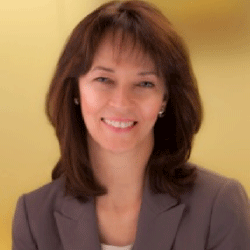
Lynn St Amour
Video Interview
Lynn St. Amour is President & CEO of Internet Matters, and is currently active in many matters of Internet development and governance. She serves as a Senior Fellow at the Global Solution Networks program at the Martin Prosperity Institute, Rotman School of Management, University of Toronto; and is Co-chair of the World Economic Forum Global Agenda Council on the Future of the Internet.
She served from 2001 - 2014 as President & CEO of the Internet Society (ISOC), a global organization dedicated to the open development, evolution, and use of the Internet. She joined ISOC in 1998 as Executive Director of its Europe, Middle East and Africa (EMEA) operations, following senior positions in Europe and the US with AT&T and Digital Equipment Corp. (DEC).
Internet Engineering Task Force (IETF)

Jari Arkko
Video Interview
Jari Arkko is Chair of the Internet Engineering Task Force (IETF) and an expert on Internet Architecture with Ericsson Research in Jorvas, Finland.
At the IETF, he has previously served six years as one of the Internet Area Directors in the Internet Engineering Steering Group (IESG) and one year as a member of the Internet Architecture Board (IAB). He has published 38 RFCs related to security, mobility, and IPv6 topics. He has been an active member of IETF teams dealing with IANA matters since 2006. He also works in a number of research projects at Ericsson.
In the past, Jari has worked in the implementation of routers, VPN software, testing tools, modem banks, cellular network nodes, AAA systems, compilers, and AI systems. He received his Licentiate's degree from Helsinki University of Technology in 1996. He likes to build and and use the technology that he works with. For instance, he builds smart home networks as a hobby.
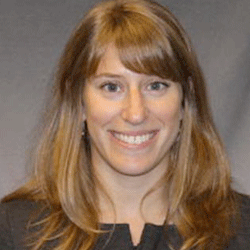
Alissa Cooper
Chair
Video Interview
Alissa Cooper is a Distinguished Engineer at Cisco Systems, where she is responsible for driving privacy and policy strategy within the company's portfolio of real-time collaboration products. She currently serves as Real-Time Applications and Infrastructure (RAI) area director within the Internet Engineering Task Force (IETF).
Previously, Alissa served as the Chief Computer Scientist at the Center for Democracy and Technology, where she was a leading public interest advocate and technologist on issues related to privacy, net neutrality, and technical standards. Alissa holds a PhD from the Oxford Internet Institute and MS and BS degrees in computer science from Stanford University.
Internet Society (ISOC)
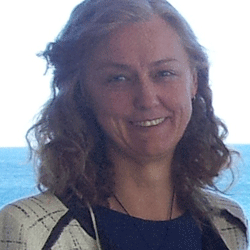
Narelle Clark
Video Interview
Narelle Clark is a data communications and Internet specialist who has been working in advanced technology areas consistently throughout her career. Specializing in the application of networks and systems, Narelle has a broad technical and strategic view of Internet scale ICT delivery and has been a user, builder, operator and researcher of Internet networks since 1986, both for major telcos and research agencies inside and outside Australia.
With a strong background in public (government and not-for-profit) and private sector organizations in both organizational leadership and governance, Narelle has both practical and academic expertise. Narelle holds a Bachelor of Applied Science (Physics), a Masters in Engineering (majoring in information systems and telecommunications), and a postgraduate diploma in management.
Narelle has been involved in one of the Internet Society's strongest chapters, ISOCAU, since it was formed in 1996, and is currently its President. During this time ISOCAU has been a thought leader in Internet development in Australia. In addition, she is the Deputy CEO of the Australian Communications Consumer Action Network (ACCAN), the peak body acting on behalf of communications consumers in Australia working actively for affordable, accessible and available communications. As such, Narelle participates in a range of consumer consultation forums on communications issues.
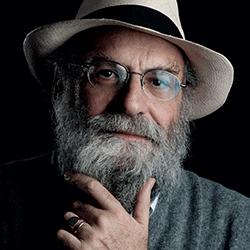
Demi Getschko
Video Interview
Demi Getschko has been involved in international networking since 1987 and took part on the team that established the first Internet connection to Brazil. He has been a member of the Brazilian Internet Steering Committee (CGI.br) since its creation in 1995 and has served as administrative contact for the ccTLD .br since 1989. He played a critical role in the definition of the Brazilian DNS tree and in defining the rules that govern the Brazilian registry. Since 1995, Dr. Getschko is an individual member of Internet Society - ISOC and he is currently the Vice-President of the ISOC Brazilian Chapter. He holds BSc, MSc, and PhD, degrees in Electronic Engineering from the University of Sao Paulo in Brazil.
Dr. Getschko was selected for the ICANN Board by the ccNSO - Country Code Names Supporting Organization - in 2005. In 2007 he was reelected and served his second term until June 2009.
Currently Dr. Getschko work as Associate Professor in Computing Architecture at Pontifícia Universidade Católica de São Paulo (PUC-SP), Vice-President of ISOC Brazilian Chapter, a Board Member of CGI.br and CEO of the Brazilian Network Information Center (NIC.br).
In April 2014 he was elected the first Brazilian to appear on the Hall of Fame of the Internet to "Global Connectors" category for his "key role in establishing the first Internet connection in Brazil." The ceremony was held in Hong Kong by the Internet Society.
Number Resource Organization (NRO)

Alan Barrett
Alan Barrett's involvement with the Internet began in 1989, when he was a lecturer in the Electronic Engineering department at the University of Natal, Durban, South Africa. During 1990 and 1991, he played a key part in the transformation of the South African universities network to the TCP/IP protocols and in its connection to the global Internet. He operated the primary name server for .ZA at that time. He was a cofounder of South Africa's first commercial Internet service provider, in 1993. In 1997, he was the primary author of the proposal to form Afrinic, and he served on the Afrinic Board from its inception until 2009. He has been a member of the ASO Address Council since 2005.
He was also one of the founding members of the South African chapter of the Internet Society, and one of the founding members of Namespace ZA, an organisation that was intended to oversee the .ZA ccTLD before that role was taken over by legislation.

Paul Wilson
Paul Wilson has twenty-five years' involvement with the Internet, and over fifteen years as the head of APNIC, and Regional Internet address Registry for the Asia Pacific. In his current role, he contributes expertise to many regional and global forums related to the development and governance of the Internet. In 2012 he was also selected to the Multi-stakeholder Advisory Group for the Internet Governance Forum (IGF).
Previously as CEO of Pegasus Networks, the first private ISP in Australia, Paul worked with the International Development Research Centre, helping to establish many early Internet services in developing economies of the region.
Root Server System Advisory Committee (RSSAC)
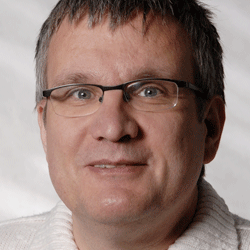
Daniel Karrenberg
Video Interview
Daniel Karrenberg is chief scientist at the RIPE NCC, the regional Internet registry for Europe and surrounding areas. He advises on research, creation and piloting of new services as well as general strategy development.
A computer scientist by training, Daniel likes to invent, design and implement Internet related systems, especially those collecting and processing data about the Internet itself. He also likes to occasionally inject physics, engineering and "networking style" into debates about Internet governance.
Daniel maintains his public bio on LinkedIn.
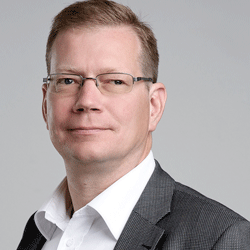
Lars-Johan Liman
Lars-Johan Liman is Senior Systems Specialist at Netnod Internet Exchange in Stockholm, Sweden. He is the technical lead for i.root-servers.net, one of Internet's 13 root name servers for the DNS system. He is also one of two co-chairs for ICANN's Root Server System Advisory Committee (RSSAC).
Lars-Johan holds a Master of Science degree in Engineering Sciences from The Royal Institute of Technology (KTH) in Stockholm, Sweden, majoring in Applied Physics. Between 1992 and 2000 he worked at the combined network operations centre for the Swedish academic and research network SUNET, the joint academic network for the Nordic countries NORDUnet, and one of the first pan-European backbones Ebone (no longer in business). In 2000 he moved to Autonomica, a newly created subsidiary to Netnod. Autonomica was merged into the mother company Netnod in 2010.
Lars-Johan focused on DNS early on, and has held various technical and administrative roles related to the DNS over the years. He's been involved with i.root-servers.net since 1992, and his currently functions include: responsible for i.root-servers.net, co-chair of RSSAC, member ICANN RSTEP, member of the IETF DNS Directorate, designer and maintainer of DNS systems for dozens of TLDs.
Lars-Johan's previous engagements include: Chair of the IETF DNSOP working group, member of ICANN's NomCom, member of the gTLD-MOU Policy Oversight Committee during the creation of ICANN. Lars-Johan also operates a small consulting business (Cafax) in which he advises on, and conducts commercial training in, all aspects of DNS technology.
Security and Stability Advisory Committee (SSAC)
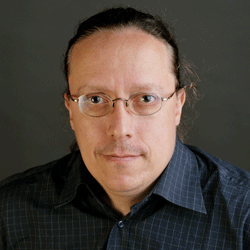
Patrik Fältström
Vice Chair
Patrik Fältström is Head of Research and Development at Netnod. Previously, Fältström was a distinguished engineer at Cisco, technical specialist at Tele2, systems manager at the Royal Institute of Technology, researcher at Bunyip Information Systems in Montreal and a programmer in the Royal Swedish Navy. He has been working with UNIX since 1985, DNS since 1987, and been involved in Internet-related standardization since 1989, both in Sweden and worldwide. Fältström is one of the editors of the standards of Internationalized Domain Names (IDN) and E.164 number mapping in DNS (ENUM) created in the Internet Engineering Task Force (IETF), and was one of two area directors of the applications area for five years, followed by being a member of the Internet Architecture Board (IAB) for three years and member of ISOC Board of Trustees 2006-2009.
Regarding Internet governance issues, he was around 1998 a member of the gTLD Policy Oversight Committee that discussed the gTLD process, a process that later turned into ICANN. After the WSIS process, in 2006, he was involved in the creation of the Internet Governance Forum where Fältström was a member of the Multistakeholder Advisory Group for three years and then advisor to the Chair for two years. He has been an appointed advisor to the Swedish IT Minister since 2003, member of ICANN Security and Stability Committee since 2005 and its chair since 2011. 2014 he was appointed to the Research Advisory Network of the Global Commission of Internet Governance. He is or has been a member of numerous other advisory groups and investigations related to Internet during the years, both public and private sector including ICANN, Packet Clearing House, Telio, HotSIP, Yubico, Swedish Regulator PTS, Telia-Sonera International Carrier, Tele2, .SE, Swedish and US Government and the European Commission.
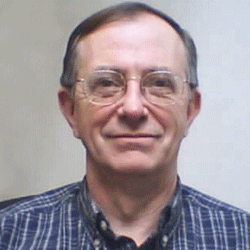
Russ Mundy
Video Interview
Mr. Mundy has worked in communications, security and computer networking since the 1970's. His current position is Principal Networking Scientist at Parsons where he leads a group engineers and researchers whose primary focus is improving the security of Internet infrastructure technologies. Much of Mr. Mundy's early career was with the U.S. Department of Defense (DoD) where his responsibilities involved many aspects of design, engineering, security and operations of communications and computer networks.
Mr. Mundy was involved with the DoD's decision to use ARPAnet technology as the basis for DoD's operational data network. As the first large-scale operational use of technology that is now known as the Internet, Mr. Mundy was involved with creation and evolving of DNS, several routing protocols, remote network management as well as sponsoring the fledgling Internet Engineering Task Force (IETF). Mr. Mundy's last position in the DoD was as Chief Scientist for the U.S. DoD's Defense Data Network.
After leaving the U.S. DoD, Mr. Mundy took a position with Trusted Information Systems (TIS) as a senior research scientist where he lead and conducted research in the areas of Internet infrastructure security, network security, trusted operating systems and protocol development. The group currently led by Mr. Mundy was initially formed at TIS with the mission of improving the security of the Internet infrastructure. This group has been involved with purchases several times and is now part of Parsons. Mr. Mundy and his group have been involved with most aspects of DNSSEC from it's earliest days including writing the first implementation and providing IETF Working Group leadership. Mr. Mundy was also instrumental in creation and standardization of SNMPv3 as the Chair/CoChair of the IETF SNMPv3 Working Group as well as providing two implementations of the protocol. He has also conducted research in the areas of routing security and integration of computing and cryptographic technologies. In addition to participation in the IETF, Mr. Mundy has been a member of the ICANN Security and Stability Advisory Committee (SSAC) since its inception.
ICANN Board Liaison
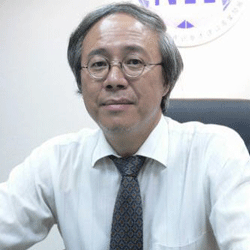
Kuo-Wei Wu
Mr. Kuo-Wei Wu has a technical, management and policy experience in Internet. He is one of the pioneers of HPC Asia, TANET, TWNIC, APTLD, and CDNC. In term of board membership, he is currently a board member or executive council of TWNIC (2000 — now), APIA (2008—now), TWIA (2008—2013) and COSA (1995—2012). He was a board member or executive council of PIR (2008—2010), APNIC (1999—2010).
He has experience in supervision, financial, and governance. In regard to Internet-related management, Mr. Wu was the deputy director of NCHC (1990—1998), where he was responsible for TANET backbone operation to serve all the universities, research institutions in Taiwan. He is the co-founder of Asia Pacific Supercomputer Center Consortium (HPC Asia) to lead the experience sharing over all the Asia Pacific Supercomputer Centers. He started Internet-related works since he worked for Cray Research, Inc. (1984—1990), and a vice-president of Yam Digital, Inc. When he was a vice-president of Acer, he lead the Internet service business for Acer (2000—2004). He actively involved in ICANN activities (GAC, ALS, ccNSO, ASO) since 1999 until now. He also actively participated UN/WSIS (2004—2005), and UN/IGF (2006—2009). He is the CEO of NIIEPA (Taipei, 2004—now) – a non-profit organization working on the research and consultant services in Internet policy and Information security for government, research institutions, universities, and industry.
Mr. Wu was elected by the Address Supporting Organization to a three-year term that expired on 21 November 2013. In June 2013 he was re-elected for a three-year term, which will expire at the end of the Annual General Meeting in 2016.
IANA Staff Liaison Expert
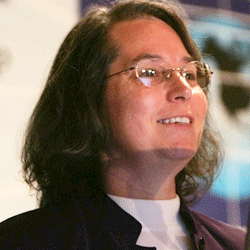
Elise Gerich
Elise Gerich, a 21-year veteran of Internet networking, is the Vice President of IANA and Technical Operations at ICANN.
Before joining ICANN, Gerich worked for Juniper Networks for nine years, serving most recently as Director of Software Product Management. Prior to that, she worked as the Director of Operations for the @Home Network, which built and operated the first national backbone for delivery of Internet Services by North American cable operators. Prior to joining @Home Network, Gerich served as the Associate Director National Networking at Merit Network in Michigan. While at Merit she was also a Principle Investigator for NSFNET's T3 Backbone Project and the Routing Arbiter Project.
In addition to her commercial experience, Gerich has been the Co-chair of the Internet Planning Group (IEPG), Chair and Co-founder of the North American Network Operators' Group (NANOG), the National Science Foundation's representative on the Federal Engineering Planning Group and a member of the Internet Architecture Board (IAB). Gerich holds a Bachelor of Arts from the University of Michigan.

